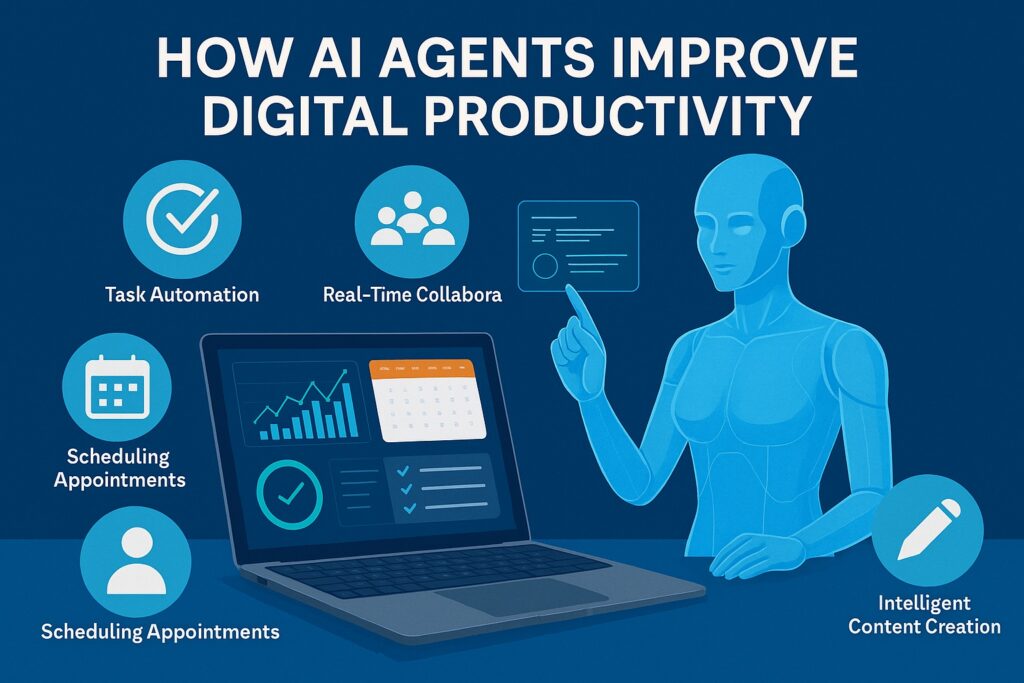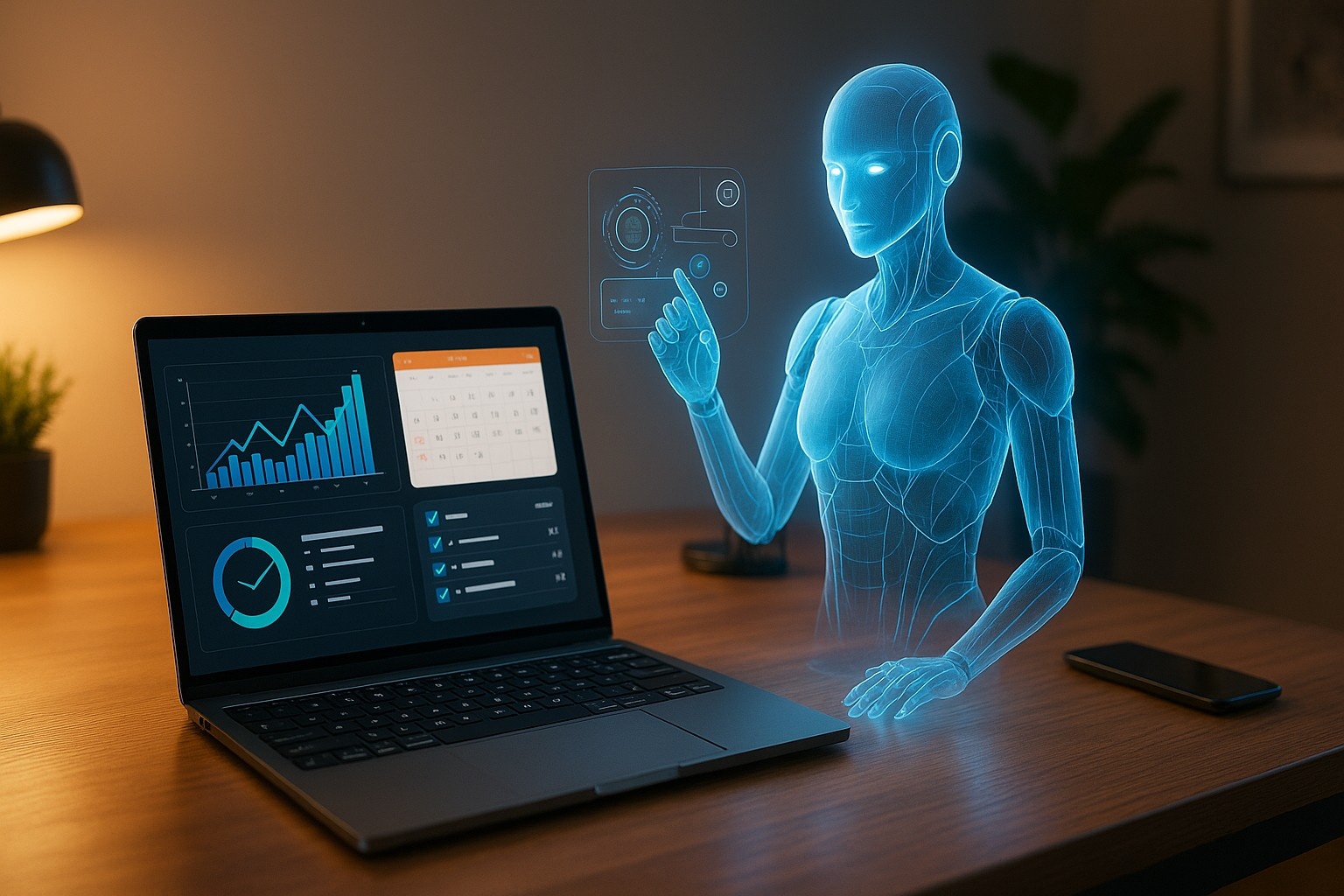Introduction
Digital productivity is undergoing a transformation unlike anything we’ve seen before. What started with simple automation tools and chatbots has evolved into something far more powerful: AI agents. These intelligent systems are reshaping how we work, collaborate, and stay organized—making productivity smarter, faster, and more autonomous.
Whether you’re managing a business, juggling side hustles, or simply trying to get through a hectic day, AI agents can help you do more with less stress. Let’s dive into how they’re changing the game.
What Are AI Agents?
AI agents are self-directed systems driven by artificial intelligence, capable of completing tasks, adapting through experience, and making independent decisions. Unlike conventional bots that rely on prewritten scripts, AI agents are:
- Context-aware: They understand your work patterns and preferences.
- Goal-driven: They aim to complete objectives efficiently.
- Multimodal: Capable of understanding and interacting through text, audio, images, and more.
Imagine having a digital teammate who can schedule meetings, answer emails, research topics, and even write reports—without you lifting a finger.
🔗 Learn more about AI agents in Google’s digital trends
Why AI Agents Are Trending Now
The rising fame of AI agents is far from coincidental. Several key factors are driving this momentum:
- Remote work evolution: With flexible work becoming the norm, there’s a demand for smarter tools.
- AI advancements: Large language models like GPT and Gemini have enabled more human-like automation.
- Digital overload: Workers are overwhelmed by notifications, tasks, and tools. AI agents help declutter workflows.
📈 Check current interest in “AI productivity tools” on Google Trends
How AI Agents Improve Digital Productivity

1. Task Automation
AI agents handle routine activities like:
- Scheduling appointments
- Managing to-do lists
- Sending reminders
- Auto-sorting emails
Popular tools include:
- Reclaim.ai – smart calendar optimization
- Motion – AI task planner
- x.ai – AI scheduling assistant
2. Real-Time Collaboration
Integrated with platforms like Slack, Notion, or Google Workspace, AI agents can:
- Summarize conversations
- Assign tasks based on context
- Draft follow-up emails
3. Intelligent Content Creation
For marketers and writers, AI agents help:
- Generate blog drafts
- Create social media posts
- Analyze SEO and audience insights
Tools you might enjoy:
- Jasper AI
- Copy.ai
- Surfer SEO
AI Agents vs. Traditional Chatbots
| Feature | Traditional Chatbot | AI Agent |
|---|---|---|
| Requires scripting | Yes | No |
| Learns over time | No | Yes |
| Context awareness | Limited | High |
| Multitasking | No | Yes |
| Human-like reasoning | No | Yes |
Use Cases: AI Agents in Action
✨ For Freelancers:
Emma uses Notion AI as her assistant. It drafts client emails, organizes projects, and reminds her of due dates—all while syncing with her calendar.
🧑💼 For Corporate Teams:
A sales team integrated an AI agent with HubSpot CRM to analyze call transcripts, recommend follow-ups, and prioritize leads.
💡 For Students:
An AI learning assistant summarizes lectures, quizzes key concepts, and helps plan study sessions.
Benefits of Using AI Agents
- 🕒 Saves time: Repetitive work is reduced by 40–60%.
- 💼 Boosts focus: Minimizes context switching.
- 🧠 Enhances decision-making: Offers data-driven suggestions.
- 🧘 Improves well-being: Less stress and digital fatigue.
💬 “It’s like having a full-time assistant that never sleeps.” — User review on Product Hunt
Challenges and Ethical Concerns
🔒 Data Privacy
- Where is your data stored?
- Is it used to train models?
- How secure is the agent’s access to your tools?
🧠 Dependence on Automation
Over-reliance on AI could reduce critical thinking. Balance is key.
⚖️ Transparency
Users should know when AI is acting on their behalf. Transparency builds trust.
🔗 Read more from Lifewire on AI workplace ethics
The Future of AI Agents in Productivity
🔮 Hyper-Personalization
AI will learn your tone, energy levels, and preferences to support your flow.
🤝 Agent Collaboration
Multiple AI agents may soon work together across departments.
🌐 Integration with Emerging Tech
Expect integrations with IoT, blockchain, and AR/VR platforms.
How to Get Started
Begin with beginner-friendly tools like:
- ChatGPT with custom instructions
- Notion AI for note-taking and summarization
- Reclaim.ai for calendar syncing
- Otter.ai for meeting transcriptions
🔗 Also explore:
Internal Resources from ByteToLife
- Top AI-Powered Cyber Threats in the Modern Era
- Multimodal AI: The Next Tech Frontier
- Digital Side Hustles Powered by Automation
Conclusion
AI agents are turning digital productivity into a dynamic, intelligent experience.By automating routine tasks, improving decision-making, and enabling seamless collaboration, these agents are becoming essential tools in every professional’s workflow.
But as with all technologies, the key lies in how we use them—responsibly, ethically, and creatively.
💡 Ready to try your first AI agent? Start simple and scale as you grow.



